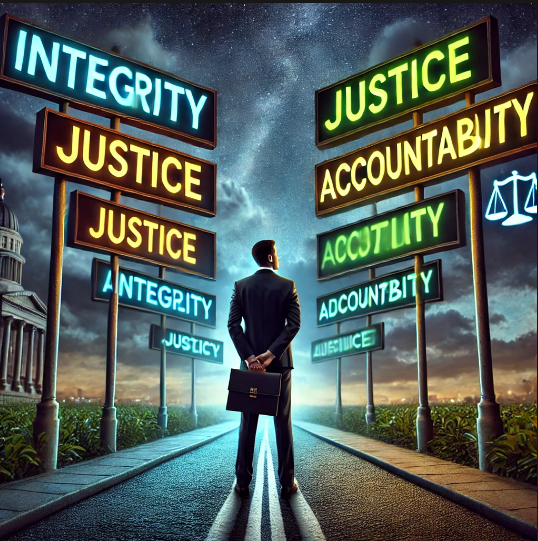Understanding Moral Insight
Moral insight refers to the ability to discern and understand the ethical dimensions of a situation, enabling individuals to make choices that align with moral and ethical principles. It goes beyond recognizing what is right or wrong; it involves a deeper comprehension of the values, principles, and consequences associated with an ethical dilemma. Moral insight requires critical thinking, empathy, and a commitment to fairness and justice.
In the context of civil services, moral insight is particularly important because civil servants frequently encounter situations where ethical considerations come into play. These situations often involve conflicting interests, competing values, or pressures to act against ethical norms. Moral insight helps civil servants navigate such challenges effectively.
Key Components of Moral Insight
- Ethical Awareness
Recognizing ethical issues in a situation is the first step. A civil servant must identify when a situation involves moral conflict, such as a clash between personal interests and public duty. - Empathy and Compassion
Understanding the perspectives and needs of others is crucial. Empathy allows civil servants to consider the impact of their decisions on diverse stakeholders. - Critical Thinking
Analyzing the ethical dimensions of a problem helps in weighing the consequences of various actions. Moral insight involves evaluating options to find the most ethically sound solution. - Value Alignment
Moral insight requires aligning decisions with core values such as integrity, justice, transparency, and accountability. - Foresight
Predicting the long-term implications of a decision ensures that actions taken today do not lead to adverse outcomes in the future.
How Moral Insight Helps Civil Servants in Ethical Situations
Civil servants are entrusted with significant responsibilities that directly impact society. The nature of their work often puts them at the crossroads of ethical dilemmas, such as balancing efficiency with fairness, or following orders that conflict with their personal values. Moral insight equips them to address these challenges effectively. Here’s how:
- Promoting Public Trust
Ethical decision-making fosters trust between civil servants and the public. By demonstrating fairness and integrity, civil servants can build confidence in public institutions. - Resolving Conflicts of Interest
Moral insight helps civil servants identify and manage conflicts of interest. For example, when faced with pressure from influential stakeholders, they can rely on ethical principles to guide their actions. - Ensuring Accountability
A morally insightful civil servant takes responsibility for their actions and decisions. This accountability is essential for maintaining the credibility of public administration. - Balancing Competing Interests
Civil servants often face situations where they must balance the interests of different groups. Moral insight enables them to prioritize actions that serve the greater good. - Upholding the Rule of Law
Adhering to the law is a fundamental duty of civil servants. Moral insight ensures that their actions are both legally and ethically sound. - Handling Corruption and Misconduct
Moral insight gives civil servants the strength to resist corruption and report unethical behavior. It empowers them to uphold ethical standards even in challenging environments. - Enhancing Decision-Making
In situations where the right course of action is unclear, moral insight provides clarity. It helps civil servants weigh options and choose paths that align with ethical values.
Real-Life Applications of Moral Insight in Civil Services
- Policy Implementation
A civil servant implementing welfare schemes must ensure that benefits reach the intended recipients without bias or favoritism. Moral insight helps in creating transparent and fair processes. - Crisis Management
During natural disasters, civil servants may face tough choices, such as prioritizing resource allocation. Moral insight ensures that decisions are made with fairness and compassion. - Addressing Social Inequalities
Civil servants working in areas with significant socio-economic disparities must act to reduce inequalities. Moral insight guides them to advocate for marginalized communities. - Maintaining Neutrality
In politically sensitive situations, civil servants must maintain neutrality and act in the best interest of the public. Moral insight helps them navigate these challenges without succumbing to political pressures.
Cultivating Moral Insight in Civil Services
- Ethics Training
Regular training programs on ethics and values can enhance the moral insight of civil servants. These programs should include case studies and real-world scenarios. - Mentorship and Guidance
Senior civil servants with strong ethical standards can mentor juniors, sharing their experiences and insights to help them develop moral clarity. - Encouraging Reflective Practices
Reflecting on past decisions helps civil servants learn from their experiences and refine their ethical reasoning. - Creating a Supportive Culture
An organizational culture that values integrity and transparency fosters moral insight. Encouraging open discussions about ethical challenges can also contribute to this. - Incorporating Ethics in Recruitment
Assessing the ethical reasoning and values of candidates during the recruitment process ensures that civil services attract individuals with strong moral foundations.
Moral Insight as a Foundation for Ethical Leadership
Civil servants often serve as leaders in various capacities, and ethical leadership is critical for maintaining public trust. Moral insight ensures that leaders can inspire their teams to act ethically, even under pressure. By setting an example of integrity, civil servants promote a culture of fairness and transparency in public administration.
Encouraging Social Justice
Moral insight enables civil servants to recognize and address systemic injustices. It helps them champion equitable policies, ensuring that marginalized and vulnerable populations receive fair treatment. For instance, during resource allocation, moral insight helps civil servants prioritize those in greatest need, fostering social justice.
Building Long-Term Solutions
Ethical dilemmas often require solutions that balance immediate needs with long-term implications. Moral insight helps civil servants think strategically, ensuring that their decisions not only solve current issues but also prevent future problems. For example, implementing sustainable environmental policies requires moral insight to balance development with ecological conservation.
Bridging Bureaucratic and Public Expectations
Civil servants often act as intermediaries between government policies and public expectations. Moral insight helps them navigate this space by interpreting policies ethically and communicating transparently with the public. This builds confidence in governance and reduces conflicts between citizens and the administration.
Strengthening Democratic Institutions
Ethical conduct by civil servants is essential for the health of democratic institutions. Moral insight fosters respect for laws, accountability, and impartiality, strengthening the integrity of governance. When civil servants consistently act with moral insight, it creates a ripple effect, reinforcing ethical practices across institutions.
Tackling Technological and Ethical Challenges
In modern governance, technological advancements such as AI and data analytics pose unique ethical challenges. For instance, ensuring privacy while using data for public welfare requires moral insight to navigate these dilemmas responsibly. Civil servants equipped with moral insight can make informed decisions that balance innovation with ethical considerations.
Role in Crisis of Conscience
Moral insight is especially crucial in moments when civil servants face a crisis of conscience—situations where their personal values conflict with institutional directives. By relying on moral insight, they can find ethical solutions that honor both their principles and their professional responsibilities.
Conclusion
Moral insight is a cornerstone of ethical governance and an essential quality for civil servants. It enables them to navigate complex ethical dilemmas with integrity, ensuring that their actions serve the public interest and uphold democratic values. By fostering moral insight, civil services can build trust, ensure fairness, and contribute to the overall development of society.
For aspiring civil servants, cultivating moral insight is not just a professional necessity but also a personal commitment to ethical excellence. The broader impact of moral insight on civil servants’ ability to manage complex ethical situations, ensuring that governance remains just, inclusive, and effective.




